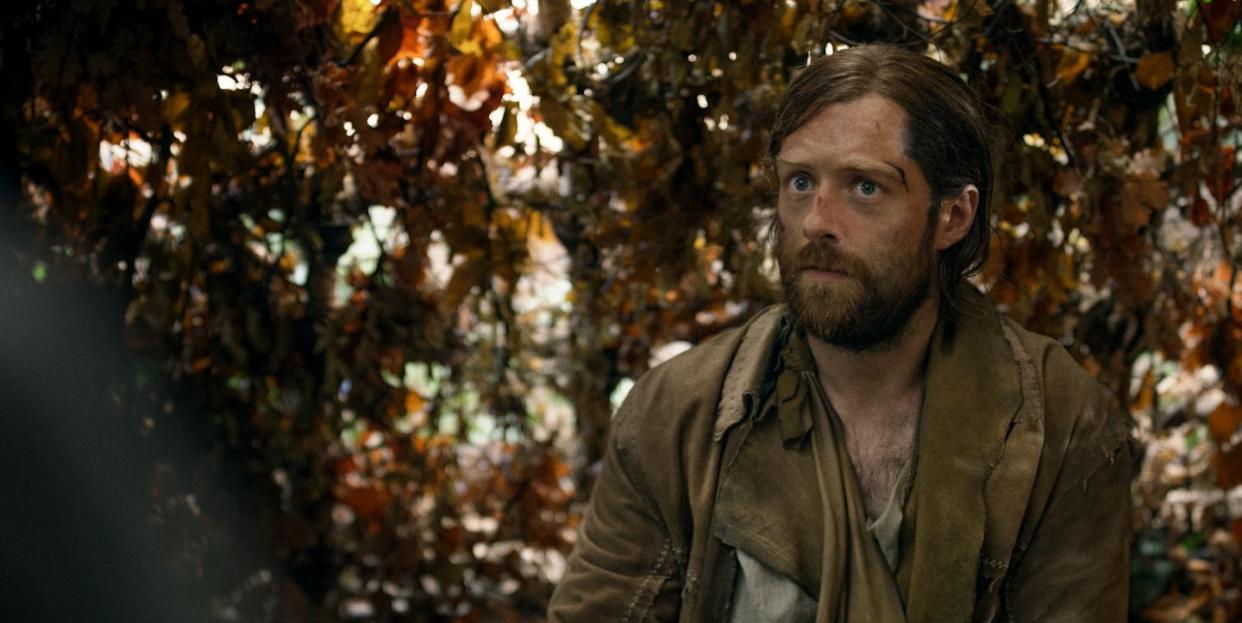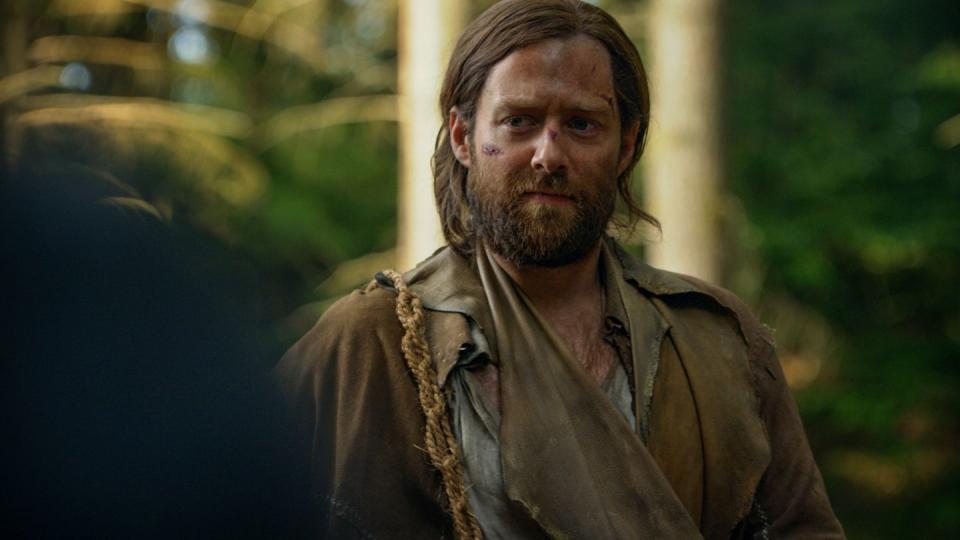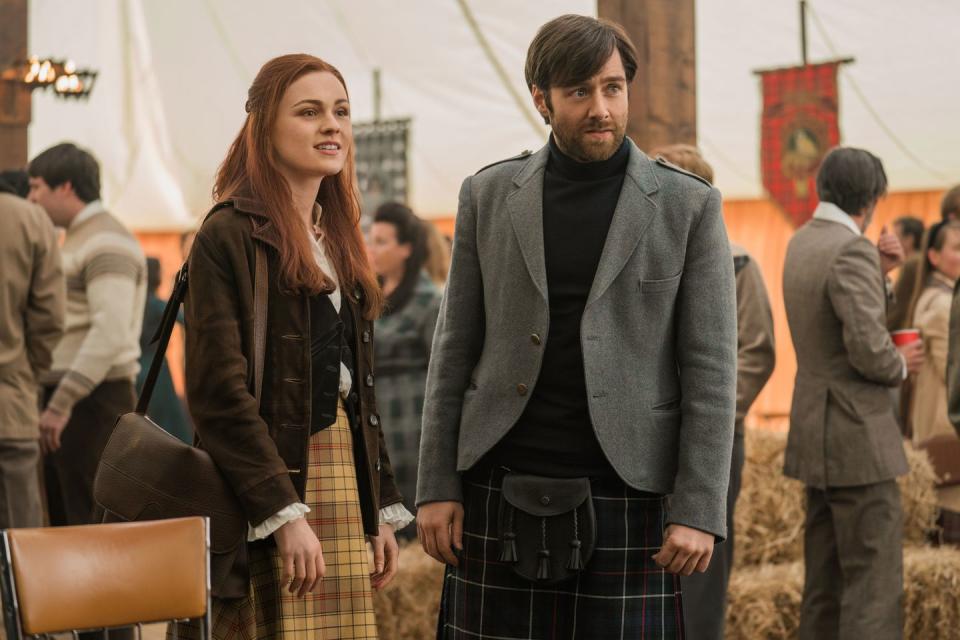Outlander Actor Richard Rankin Weighs in on Roger's Role in Tonight's Shocking Final Scene

Roger MacKenzie has covered a lot of ground on this season on Outlander. He's traveled through the stones and across an ocean in search of Brianna. And just as Roger and Bree finally found each other through time and space, they were quickly torn apart again, and Roger was forced to work on Stephen Bonnet's ship as it traveled up the coast of colonial America. A horrible misunderstanding prevents a second reunion for the couple, and sets into motion Roger's most recent journey with the Mohawk people, who marched him from North Carolina to New York state in captivity.
In tonight's episode "Providence," Roger has an opportunity to escape the Mohawk village, but instead, he returns to help his friend and fellow prisoner, a priest named Father Alexandre, played by French actor Yan Tual. The resulting scene, in which Roger hastens Alexandre's death, ending what would have been days of suffering, is quite shocking.
T&C spoke with actor Richard Rankin on what it was like filming the explosive scene, how he feels about the ongoing debate over Roger's likability, and the show's passionate fans, below.
The final scene of this episode is so shocking to watch. What was it like to film?
That was a strange one to shoot because there was a lot going on-it was complicated. There was a lot I had to process as the character. First of all, I don’t think Roger really knew how he was going to intervene, how he was going to help. He just thought he had to. There is something in him, inherent, that he has to help in any sort of situation of peril or anyone in distress.
What he ultimately is able do is give the father a speedy death. Otherwise he would just be on that pyre for days and days, and would have had a very slow, agonizing death. What Roger unfortunately didn’t foresee is that his actions would also give an escape to the father’s wife. She climbs aboard the fire and burns to death herself.
Roger escapes from captivity, but he comes back to help Father Alexandre. What do you think of that decision?
I think that’s just indicative of Roger’s character. I think there’s this overwhelming compassion in him to help other people in need. He wants to escape, and he’s telling himself not to be stupid. He’s saying to himself, “Roger, this is what you do time and time again. You find yourself in these situations; you should turn a blind eye; you know what the out is here, take it." And he doesn’t because he can’t. There’s just something in him that needs to help people.
And that’s what draws him back, even though ultimately, it could be the end of Roger. With Father Alexandre, I think Roger sees that he is as such a good man with such a tragic story. He thinks the least that he can do is go back. At that point, he doesn’t know what he’s going to do to, but it turns out that a quick death is the best that he can give him.

You keep mentioning Roger’s inherent compassion, but this season, there has been a lot of conversation online about whether Roger is a good person. What’s your perspective on that debate?
I think the question of whether Roger is good or not is a ridiculous question. I’ve seen it come up quite a lot, and I think, “Are you serious?” Look at what the man does. Look at the lengths that he goes to. He puts his entire existence on the line. He abandons his entire life, which is a pretty good life. He’s an assistant professor of history at Oxford, a decent job. He’s a well-educated, well-respected man, and he doesn’t think twice about giving it all up and going after Brianna to try and see her safely home.
Obviously, there are arguments that arise between the two of them. They are both very stubborn people. They both have strong opinions. Brianna is a modern, independent, free-thinking woman, and Roger is quite a traditional, old-fashioned man, very much the result of his upbringing by his father. I think these two are very different people with very differing opinions, and as much as they love each other, that’s going to cause conflict. Communication breaks down between them. And I think Roger could go about things differently. I’m not saying his approach was optimal by any means.

His timing certainly wasn’t great for his proposal. Right? It was poorly judged, but I like that. I like the fact that he thought, “No, I want this to be perfect,” and then it escalates. There’s truth in that. There’s relatability in that. And I think the reason we’ve had so many questions about Roger, about his approach, about that relationship, is because as much as people hate what happened, or hate how he went about it, or hate how Brianna went about it-I’ve seen two sides of that coin-it’s relatable in some sense.
People see an honesty to it; people see a truth in it. They think, “I believe that could happen in a relationship.” Relationships are complicated. People say things they don’t mean. They say things to hurt each other. People respond in a similar fashion when they’ve been hurt. They’ll lash out and say things just to provoke. And that’s what Roger and Brianna do.
These are people from the '60s and '70s, when people behaved very differently. And these characters, they aren’t even particularly indicative of their own time-Brianna is much more modern. She’s ahead of her time, and Roger has maybe one foot in the past. I think a lot of people are looking at their relationship through a modern lens, from a 2019 perspective, and judging it from there, when in actual fact, it played out how I would have expected an argument between the two of them to play out.
Sophie and I spoke at great length about what we wanted to achieve in those scenes, and how we wanted to bring an honesty and a truth. First and foremost, you want to bring something that’s going to ring true between the two of them, and if that comes at the expense of Roger seeming less good, then so be it. I’m not playing the character to be liked, I’m trying to play it as honestly as it’s written. But the question of “Is Roger a good person?” is nonsense. Of course he is. Look at the things he’s done since he’s gone back; look at the things he continues to do.
How do you think he’s changed over the course of this season?
He’s dramatically changed over the course of the season, and that’s one of the things that excited me most about his character. He goes through such an evolution, such a change through all of his experiences and all of his challenges.
I think we see a very different, deep, interesting character by the end of season four, which gives us an exciting platform into season five with him.
I think we aren’t sure sure what to expect from him now. When we leave him at the end of season four, we’re unsure with what we think of him and what we think he might be about now. Whereas, we were certain in seasons two and three of what he was. There’s was no question that he was this lovely, friendly, loving, humble assistant professor of history at Oxford, but he’s not that anymore. He’s very much a changed person.
Outlander is known for having passionate fans, and some have even formed groups focused on you like the "Rank and File." What's it like interacting with them?
I love interacting with them. I love having healthy debate and conversation. People have sensible questions and discussions that they want to have about the character or about the story and the other characters.
If I come across something interesting, I’ll engage with it because our fans are very intelligent. They’re very dedicated and very loyal. We’re very grateful and very happy for that, and we love to have them. We wouldn’t be where we are without them, obviously. But I do enjoy the level of debate and discussion that they bring. It can be good fun to just sit and have a bit of banter with them.
('You Might Also Like',)

